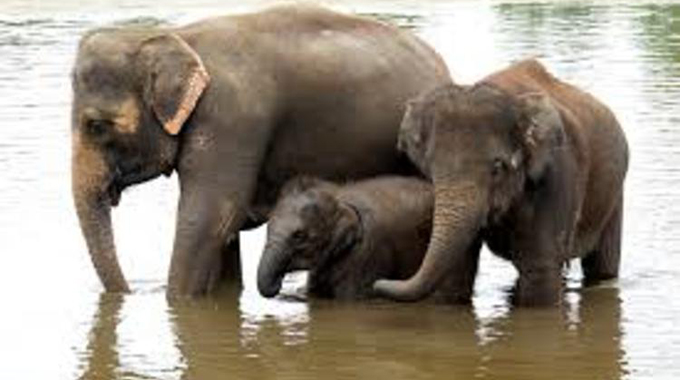55 jumbos die in two months in Hwange

Africa Moyo Deputy News Editor
Zimbabwe has lost 55 elephants in the last two months due to starvation as water bodies run dry mainly due to a bad rainfall season last year driven by climate change.
Most rivers and dams are drying up across the country, leaving both humans and wildlife struggling to get reliable sources of water.
Zimbabwe Parks and Wildlife Management Authority (ZimParks) spokesman Mr Tinashe Farawo confirmed to The Herald yesterday that the elephants had died.
“Indeed, we have lost at least 55 elephants in Hwange due to starvation,” he said.
“Most of the carcasses are found within 50 metres of the water source.
“Our animals are travelling long distances in search of water and food. The biggest threat to the survival of our animals is loss of habitat; the situation is dire.
“It’s not only elephants which are affected (by lack of food and water), but many other species because of this climate change-induced drought.
“The situation is desperate.”
Zimbabwe and other southern African countries are grappling with serious water shortages which have also impacted on electricity generation at Kariba Dam.
Mr Farawo said animals were now straying from wildlife parks in search of food and water, resulting in the destruction of crops and in some cases, killing of people.
Over 20 people have been killed so far this year as human-wildlife conflicts escalate.
Hwange has over approximately 53 000 elephants, but its carrying capacity is 15 000 animals, prompting massive destruction of vegetation due to overcrowding.
Experts say the deaths of elephants due to water and food shortages in Hwange are nothing new this time of the season, which is dry.
The experts noted that Zimbabwe has been lobbying the Convention on International Trade in Endangered Species of Wild Fauna and Flora (CITIES) to be allowed to cull its elephants to manageable levels.
“The elephants are just too many in Hwange,” said one of the experts.
“The problem is that wildlife activists don’t want Zimbabwe to hunt, sell, kill or cull part of its elephants to create space.
“You might recall that sometime this year, an environmental lobby group called Advocates4Earth sued Government over a plan to sell 35 baby elephants to China and Pakistan. It’s all confusing.
“You just wonder what the powers that be want us to do.”
Zimbabwe and Botswana have largest elephant population in Africa and want to be allowed to hunt them to generate revenue and reduce numbers.
Botswana lifted the ban on elephant hunting this year in a bid to reduce human and wildlife conflicts.
Countries that are parties to the CITIES have pushed for a cap on the elephant sales.
President Mnangagwa has indicted that Zimbabwe needs to sell elephants to fund conservation efforts and reduce the population.
In May, Government generated US$2,7 million from the sale of 90 elephants to Dubai and China.








Comments